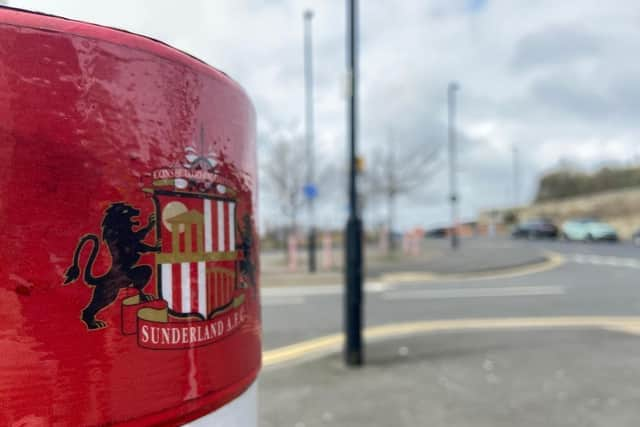Bold proposals for financial reform that would impact Sunderland and their Championship rivals
and live on Freeview channel 276
Parry spoke to regional media to stress the importance of the review, which amongst other things called for the creation of an independent regulator. It also called for a better redistribution of the wealth in the English game, though said that football should be left to establish the terms of this.
One year on there is yet to be any dialogue between the Premier League and the EFL, which has led to an update of the review calling for external intervention.
Advertisement
Hide AdAdvertisement
Hide AdAs it stands, the vast majority of the money passed down from the Premier League comes through the form of parachute payments, and teams in receipt are three times as likely to win promotion. Parry argues it not only distorts the Championship, but encourages unsustainable spending from other clubs trying to compete. The EFL's proposals would see money distributed more evenly, while also better rewarding high performance in the second tier.


The Premier League do now have a mandate from their clubs to come to the negotiating table, but says he believes the Government introducing a White Paper and launching the implementation of the review is the best way to secure a 'reset' of the game's finances.
"Our purpose is to make clubs sustainable right through the pyramid, so that they are not dependent on owner funding," Parry said.
"It doesn't mean preventing owners from spending, which is a complex debate, but we don't want every club to be reliant on owner funding for its survival. For that to happen we need redistribution of revenues and better regulation, we're fully committed to both because you cannot have one without the other.
Advertisement
Hide AdAdvertisement
Hide Ad"Our objective is to halve the cliff-edge between the bottom of the Premier League and the bottom of the Championship. Firstly we have to split the TV revenues 75/25, and then we have to look at the ratios between the top and bottom of our divisions as to how we distribute money. We're proposing an abolition of parachute payments and a ratio of 2:1 from the top to bottom in the Championship and Premier League. So that would leave the bottom team in the Premier League getting around £75 million instead of £100 million, and the top team in the Championship getting around £36 million instead of £8 million. It would then progress to around £18 million [at the bottom of the Championship] and a better, more fair competition.
"Thus far, there's been no dialogue with the Premier League. The fan-led review is our best hope [for change], it was initially targeted at regulation and licensing but we argued tirelessly that it had to be about redistribution as well. The review has been updated 12 months on to say that external intervention looks like it will be required.
"Our message to the Government is to hurry up and publish the White Paper, which is now long overdue."
Parry also repeated his call for better controls on spending in the Championship, which currently limits the losses that a club can make over a three-year period.
Advertisement
Hide AdAdvertisement
Hide AdHe says there is wide support in the second tier for limiting wage spending, but says it will not take the form of a hard salary cap. That was introduced to Leagues One and Two when Sunderland were in the former, but was dissolved after a legal challenge from the PFA.
In line with the new European Financial Fair Play rules set to be introduced, the EFL supports capping wages in proportion to turnover as part of their desire for wider redistribution of finances.
"If all that happens is the extra money goes on wages and the losses increase, then this will all have been a colossal waste of time," he explained.
"So we are absolutely committed to tighter cost controls, which is much easier to implement when you have a fairer sharing of revenues.
Advertisement
Hide AdAdvertisement
Hide Ad"We were having conversations about cost controls anyway, you look at the numbers in the Championship and they cannot possibly continue at the same rate. You can't have clubs spending 125% of their income on wages. It's nonsensical and it's not sustainable.
"When we introduced the hard salary caps in Leagues One and Two, we were well down the road of having the debate about doing the same in the Championship, at around £18 million per-club. That would have made a massive impact but we decided to pause it.
"I think we would have got it through, I think there would have been 2/3 of support, but the Premier League weren't happy with it as it was going to impact relegated teams. It would all have been a bit rushed [so we paused] but the commitment to do this better across Championship clubs is there, no question about that at all.
"At UEFA level [a cap on wages related to turnover] is coming in, and so we see that as something that could go right the way down. I don't think it would be a hard salary cap, which we've tried before.
Advertisement
Hide AdAdvertisement
Hide Ad"What we've decided is we need to tie all this together, and debate the rules in the absence of knowing exactly what is going to happen in terms of redistribution. We've done a lot of work on our own rules but we've paused it to see what the Government produces, see how that dovetails with the regulator and what their responsibilities will be, to try and make the whole thing work together.
"We see this is a once in a lifetime opportunity to have a reset. It's not about teetering around the edges or taking an extra few percentages, it's about grasping an opportunity to have a fresh look at how the game is run."